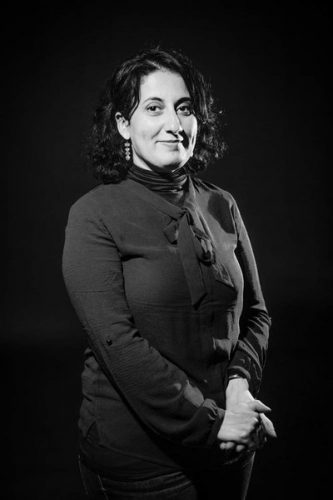
Fracking is coming to Morocco. Americans might associate the North African country on the shores of the Atlantic Ocean and the Mediterranean Sea with the black-and-white romance of Casablanca, but Morocco faces some of the same modern environmental issues as we do in the U.S.
Samira Idllalène is visiting Eugene for 10 days via the Environmental Law Alliance Worldwide to study how to make environmental laws in Morocco more effective and to give a presentation at this weekend’s Public Interest Environmental Law Conference.
Idllalène, a law professor at Cadi Ayyad University in Morocco, consults with a number of NGOs (nongovernmental organizations) on environmental issues and will bring what she gleans from her Oregon trip back to Morocco. She works not only on the newer threat of fracking for energy but also on overdevelopment along the country’s coast, the effects of climate change and coastal flooding, and preserving sub-aquatic cultural heritage such as shipwrecks.
“There are a lot of legal texts” in Morocco, Idllalène says in her carefully accented English, “but they are not really effective.” Idllalène, who teaches classes such as comparative law, law of the sea and international law in Arabic and French at Cadi Ayyad, also speaks her native Amazigh (Berber) in addition to English.
She cites an example of a coastal development that took place despite being protected by the Ramsar Convention of Wetlands, an international agreement that seeks to protect wetlands through wise-use planning for conservation and sustainable use of wetlands and their resources.
Idllalène’s trip to Oregon came about as a result of fortuitous Googling. She had been painstakingly researching possible research fellowships for herself, university by university, when she found herself telling one of her law school classes they should pursue fellowships in international law. Realizing she should do that herself, she typed “fellowship” and “environmental law” into the search engine. ELAW and its international network of public interest attorneys, scientists and advocates popped up.
Maggie Keenan of ELAW says that in the 10 days Idllalène is here, she will go to the coast, meet with lawyers and scientists and check out the wastewater treatment plant. As part of the ELAW network, Idllalène can interact with people in countries around the world facing similar environmental challenges, ranging from places like Jamaica to the Dominican Republic. The ELAW fellows “share tactics, strategies and models,” Keenan says.
The goals of Idllalène’s trip include bringing back strategies to get the Moroccan government to take the work of the NGOs seriously and giving the groups more tools. The environmental advocates in Morocco use Facebook and the internet to network and exchange ideas.
While the NGOs tend to focus broadly, Idllalène says several of them are specifically examining fracking and looking to the U.S. for examples of what the drilling and use of high-pressure water, sand and chemicals have done to the environment. A desert country, Morocco already faces challenges to maintaining its water supply.
Idllalène has a number of irons in the fire, as Keenan points out. She is also working on how the public trust doctrine and the Moroccan Muslim law habous (also known as waqf), which deals with land property legislation and has a public interest aspect, overlap.
It’s also fortuitous that Idllalène is coming to Oregon because, thanks to law scholars such as Mary Wood at the University of Oregon as well as the nonprofit Our Children’s Trust (OCT), Eugene is a locus for discussion of the trust doctrine in environmental law.
Wood writes that the public trust doctrine is the “civic and judicial understanding that some natural resources remain so vital to public welfare and human survival that they should not fall exclusively to private property ownership and control.”
According to Wood, “Public trust law demands that government act as a trustee in controlling and managing critical natural assets.”
In her work in comparative law, Idllalène studies how the public trust doctrine and Muslim law share characteristics and how using the environmental features of habous could mitigate the ineffectiveness of modern laws.
A hearing for oral arguments in a constitutional climate change case brought by OCT against the federal government using the public trust doctrine begins March 9 here in Eugene in the federal District Court in Oregon. Idllalène leaves Eugene on the 9th; however, some of the youth plaintiffs and others who have worked with the issue will be at the environmental law conference.
Samira Idllalène will be on the PIELC panel ‘Balancing Coastal Development and Protection: International Lessons’ from 10:35-11:50 am Saturday, March 5, in LAW 281 with Dr. Heidi Weiskel, a staff scientist at ELAW.
OCT’s climate litigation hearing begins 10 am Wednesday, March 9, at the Wayne L. Morse U.S. Courthouse, 405 East 8th Avenue. The atmospheric trust issue appears on several PIELC panels. The conference schedule is at PIELC.org.